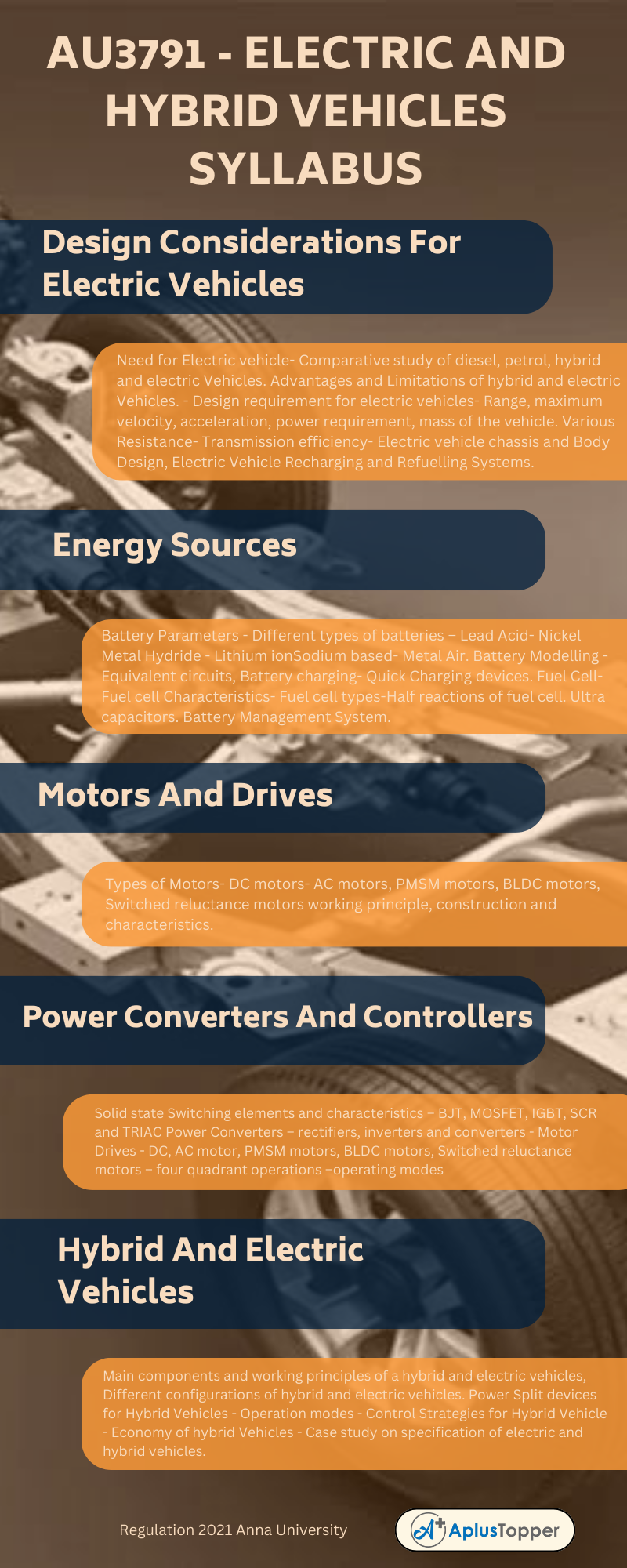Subject code AU3791 deals with the semester VII Anna University Regulation 2021, Electric And Hybrid Vehicles Syllabus. In this article, we discuss the AU3791 – Electric And Hybrid Vehicles Syllabus.
We would like to provide the syllabus to perform well in academics. Anna University Offers the B.E Automobile Engineering Syllabus including the seventh semester containing the AU3791 – Electric And Hybrid Vehicles Syllabus. We add every concept to the seventh-semester syllabus. You can get the proper information regarding the syllabus of the subject, it will assist you to excel in the academic examinations. You can also refer to our textbooks and references for more inclusive on the subject. Hope this information is useful. Don’t forget to share it with your classmates.
If you want to know more about the syllabus of B.E Automobile Engineering Syllabus connected to an affiliated institution’s four-year undergraduate degree program. We provide you with a detailed Year-wise, semester-wise, and Subject-wise syllabus in the following link B.E Automobile Engineering Syllabus Anna University Regulation 2021.
Aim Of Concept:
- The objective of this course is to prepare the students to know about the general aspects of Electric and Hybrid Vehicles (EHV), including architectures, modelling, sizing, and sub-system design and hybrid vehicle control.
AU3791 – Electric And Hybrid Vehicles Syllabus
Unit I: Design Considerations For Electric Vehicles
Need for Electric vehicle- Comparative study of diesel, petrol, hybrid and electric Vehicles. Advantages and Limitations of hybrid and electric Vehicles. – Design requirement for electric vehicles- Range, maximum velocity, acceleration, power requirement, mass of the vehicle. Various Resistance- Transmission efficiency- Electric vehicle chassis and Body Design, Electric Vehicle Recharging and Refuelling Systems.
Unit II: Energy Sources
Battery Parameters – Different types of batteries – Lead Acid- Nickel Metal Hydride – Lithium ionSodium based- Metal Air. Battery Modelling – Equivalent circuits, Battery charging- Quick Charging devices. Fuel Cell- Fuel cell Characteristics- Fuel cell types-Half reactions of fuel cell. Ultra capacitors. Battery Management System.
Unit III: Motors And Drives
Types of Motors- DC motors- AC motors, PMSM motors, BLDC motors, Switched reluctance motors working principle, construction and characteristics.
Unit IV: Power Converters And Controllers
Solid state Switching elements and characteristics – BJT, MOSFET, IGBT, SCR and TRIAC Power Converters – rectifiers, inverters and converters – Motor Drives – DC, AC motor, PMSM motors, BLDC motors, Switched reluctance motors – four quadrant operations –operating modes

Unit V: Hybrid And Electric Vehicles
Main components and working principles of a hybrid and electric vehicles, Different configurations of hybrid and electric vehicles. Power Split devices for Hybrid Vehicles – Operation modes – Control Strategies for Hybrid Vehicle – Economy of hybrid Vehicles – Case study on specification of electric and hybrid vehicles.
Text Books:
- Iqbal Husain, “ Electric and Hybrid Vehicles-Design Fundamentals”, CRC Press,2003
- Mehrdad Ehsani, “ Modern Electric, Hybrid Electric and Fuel Cell Vehicles”, CRCPress,2005.
References:
- James Larminie and John Lowry, “Electric Vehicle Technology Explained “ John Wiley & Sons,2003
- Lino Guzzella, “ Vehicle Propulsion System” Springer Publications,2005
- Ron HodKinson, “Light Weight Electric/ Hybrid Vehicle Design”, Butterworth Heinemann Publication,2005.
Related Posts On Semester – VII:
- AU3701 – Engine and Chassis Components Design
- GE3791 – Human Values and Ethics
- AU3711 – Vehicle Maintenance and Testing Laboratory
- AU3712 – Summer Internship
Must Read For More:
